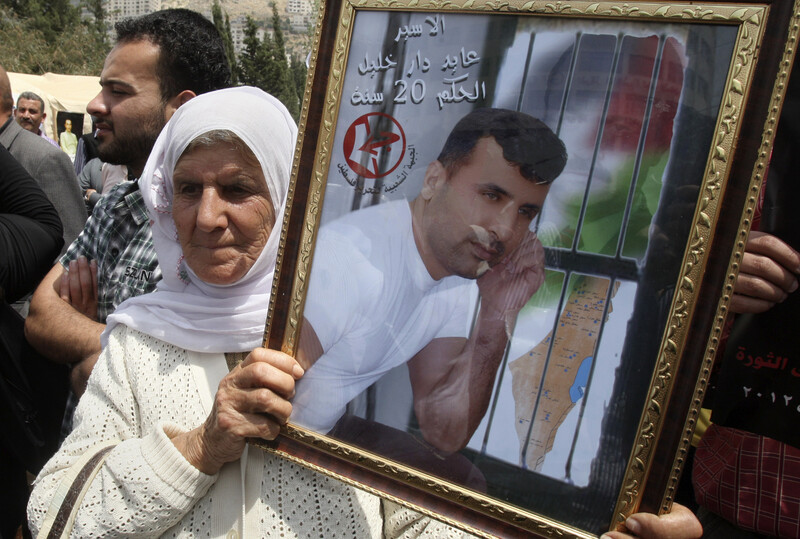Rights and Accountability 4 May 2012

A Palestinian woman holds a picture of prisoners jailed in Israel during a rally in solidarity with Palestinian prisoners in Israeli jails, in the West Bank city of Nablus, 3 May, 2012
APA imagesAmnesty International today issued a call for urgent action from individuals around the world to contact Israeli authorities about Bilal Diab and Thaer Halahleh, two Palestinian men who are at immediate risk of death on their 67th day of hunger strike. Both are being held without charge or trial by Israel.
Amnesty’s call for Urgent Action begins:
Two Palestinian hunger strikers’ lives are in danger, as the Israeli Supreme Court has delayed ruling on the appeal against their detention without charge or trial. Other administrative detainees on hunger strike are still denied access to independent doctors.
Bilal Diab and Thaer Halahleh’s petition to the Israeli Supreme Court against their administrative detention was heard on 3 May, but the judges have yet to issue a decision. Both have been on hunger strike since around 29 February, and both have told their lawyers that they have been ill-treated by Israel Prison Service (IPS) staff and physicians.
The alert also raises the cases of Hassan Safadi, Omar Abu Shalal, Jaafar Izz al-Din, and Mahmoud Sarsak, hunger strikers who remain at Ramleh prison clinic and have not been allowed to see independent doctors.
Sarsak is a member of the Palestinian national football squad who was kidnapped by Israeli forces in 2009 and has been held without charge or trial ever since.
Amnesty urges everyone reading their action alert to contact Israeli authorities using the addresses they provide to demand the release of the men.
New York Times reports on hunger strikes
Ending a lengthy silence about the hunger strikes, The New York Times published a must-read report, by its new Jerusalem bureau chief Jodi Rudoren.
Rudoren highlighted the plight of Thaer Halahleh’s family separated from their gravely ill loved one:
For most of the days since Mr. Halahleh stopped eating, his relatives, neighbors and friends have kept vigil at his home here in a remote part of the Hebron hills from 9 a.m. to 11 p.m., many of them also going without food in sympathy.
The men sit on white plastic chairs outside, spilling from a makeshift structure of black burlap and green two-by-fours, topped with Islamic Jihad flags and a banner with Mr. Halahleh’s portrait and a picture of a shackled wrist. Inside the white stone house – where family members say the son was arrested at 1:30 a.m. on June 27, 2010, by soldiers who came with dogs – women crowd on cushions on the floor, their heads covered by hijabs and their bare feet by blankets, praying and talking and pleading with the television in the corner for any speck of news.
“I am sitting with the women, but I am not here – my heart and feeling is with him,” Thaer Halahleh’s mother, Fatmeh, 58, said in an interview Tuesday night. “Sixty-five days. After two hours we feel that we want to eat. What about 65 days? We calculate the seconds.
“I am very afraid, but at the same time I am very proud,” she added. “I wish every Palestinian woman had a Thaer.”
Shireen Halahleh, 29, a physics teacher from Jordan, said that she married Mr. Halahleh in July 2009, and that he soon stopped political activity. He was arrested two weeks before the birth of their 22-month-old daughter, Lamar, who has seen her father only six times and goes to bed each night with his picture.
“He is a strong man; if he took a decision, he will do it,” Ms. Halahleh said.





Comments
Free Palestine. Free the hunger strikers held unjustly.
Permalink Elizabeth Barger replied on
I will tell everyone I know about this injustice. If the human race has any heart, it must raise its voice against the inhumanity we are seeing here. If we do not do all we can, we will suffer the fate of a dying species.
Petition for Hunger strikers
Permalink Dianne Comini replied on
Please publish this petition
Amnesty adresses Ehud Barak-- there is a petition created http://www.popularstruggle.org...
Bilal Diab and Thaer Halahleh
Permalink Francesca Rosa replied on
Bilal Diab and Thaer Halahleh are an inspiration to the world.
They should be released immediately and unconditionally.
Ta'er Halehleh, Kufr Ra'i and Bilal Diab, hunger strikers.
Permalink kate Macintosh replied on
Ta'er Halehleh, Kufr Ra'i and Bilal Diab are hunger strikers are protesting in the only way available to them, against the injustices they have suffered. I demand that they be given medical and legal help urgently.